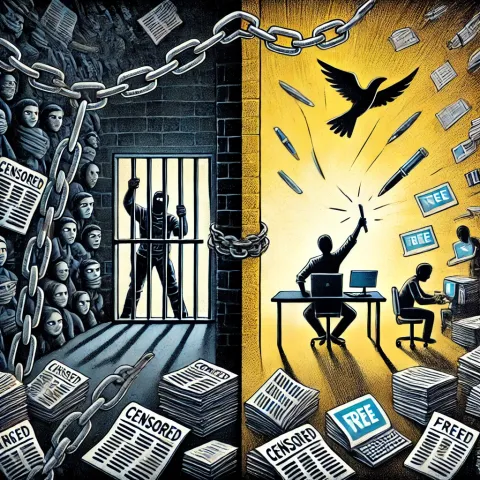Who controls the truth? Inside the media war
Modern Media War
In a world where information shapes decisions, sways elections, and builds narratives, the truth is under siege.
Journalism, once the watchdog of democracy, is increasingly entangled in a tug-of-war between corporate interests, political elites, and independent voices.
The stakes are high: who controls the truth, and will survive the relentless media war?
The Decline of Independent Journalism
Newsrooms, once symbols of integrity, are becoming tools of influence for those with deep pockets.
Across the UK, reports from media insiders reveal how advertisers and political operatives wield power over editorial decisions. Investigative stories on topics like wealth inequality and environmental scandals often face suppression or sanitisation before reaching the public. This isn’t just a British problem.
Globally, over 80% of media outlets are owned by a handful of corporations, creating a dangerous monopoly over information. For audiences, this consolidation means fewer perspectives and curated narratives that protect the powerful.
In the UK, examples abound. When journalists investigated the government’s pandemic response, they reported facing barriers, including restricted data access and gag orders on whistleblowers.
Such interference undermines journalism’s ability to hold power to account.

Tucker Carlson: A Voice of Defiance
Amid this climate of control, one name stands out: Tucker Carlson.
Known for his sharp critiques and unfiltered commentary, Carlson became a household name in the US before making headlines by leaving Fox News in 2023.
Carlson’s departure wasn’t just a career move—it was a statement against a system that demands conformity.
His fearless approach to topics like censorship, corporate control, and government overreach made him a target for the very powers he exposed.
Rather than compromise, he walked away, showing that the truth can survive outside traditional media structures. Carlson’s story is both a warning and an inspiration. It highlights the risks faced by journalists who defy the status quo and the possibilities of independent platforms to amplify their voices.

Freedom or Censorship
The UK’s media landscape sits at a crossroads.
On one side, there’s a growing push for centralised control, where dissenting voices are silenced and narratives tightly managed. On the other, independent platforms and decentralised technologies offer hope for free expression.
Recent controversies reveal the fragility of press freedom. During coverage of major political events, certain media outlets prioritised government narratives while sidelining dissenting views.
Investigative pieces on corporate malpractice, for example, often receive less prominence compared to content that aligns with mainstream economic policies. If this trend continues, audiences will face a steady diet of curated information designed to support those in power. The battle for truth isn’t abstract directly impacts public understanding and democracy.

The Rise of Alternative Platforms
In the face of censorship and consolidation, alternative platforms are emerging as sanctuaries for independent journalism. Decentralised technologies like blockchain and platforms such as Substack and Patreon allow journalists to fund and distribute their work without corporate interference.
These platforms are more than just tools—they represent movement. By bypassing traditional gatekeepers, they empower reporters to tell unfiltered stories and connect directly with audiences.
One example is British investigative journalist Carole Cadwalladr, who faced intense legal pressure after exposing misinformation campaigns and corporate influence in UK politics.
Through crowdfunding and independent publishing, she has continued her work, proving the resilience of independent journalism.

What’s Next for Journalism?
The fight for truth is far from over. Three major trends are shaping the future of the media: Pressure on independent journalists is intensifying.
Legal challenges and financial barriers are used to suppress those who challenge the establishment.
The UK’s increasing use of Strategic Lawsuits Against Public Participation (SLAPPs) exemplifies this trend.
Alternative platforms are expanding. Blockchain-based networks and crowdfunding solutions are offering journalists new ways to sustain their work.
These spaces provide hope, but they need wider public support to thrive.
Audiences are becoming more discerning. With growing awareness of media bias, people are demanding greater transparency and accountability.
Media literacy campaigns across the UK are helping citizens navigate misinformation and propaganda.
Fighting for the Truth
Preserving the truth requires action. Supporting independent journalists through crowdfunding or subscriptions can free them from corporate control. Promoting media literacy equips audiences to identify manipulation and verify sources.
Building and using alternative platforms secures spaces for free expression, ensuring that even the most controversial stories have a platform. These efforts aren’t just about protecting journalism, they’re about safeguarding democracy.
Will You Let Them Silence
You The information war isn’t just about journalists, it’s about everyone.
Will society allow the powerful to dictate what can and cannot be known?
Or will it stand up for the right to transparency and truth?
Tucker Carlson’s story is a reminder that even one voice can challenge the system. But lasting change requires collective effort. The fight for free speech and unbiased journalism depends on all of us.
The battle for truth is far from over, but its outcome isn’t predetermined. By supporting independent voices, demanding accountability, and championing free expression, we can ensure that the truth prevails in the face of manipulation.
The time to act is now.
The future of democracy depends on it.




